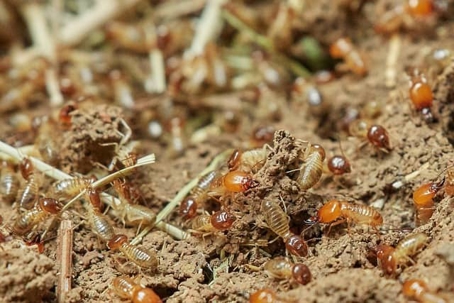Dr. Termites
Termites are often called “silent destroyers” for good reason. These small insects can quietly cause extensive damage to the structural integrity of your home, often going unnoticed until the repairs are significant and costly. But beyond the immediate physical destruction, termite damage can have lasting consequences for your home’s market value, making it more difficult to sell, refinance, or insure.
Understanding how termite activity affects long-term value is essential for homeowners looking to protect their investment. In this article, we outline the financial and structural consequences of termite infestations and explain why timely action and expert guidance are crucial.

How Termite Damage Devalues Your Property
When termites infiltrate a home, they feed on wood and other cellulose-based materials that support the building’s framework. Over time, this destruction weakens floors, walls, and ceilings. Even if the damage is repaired, the home’s history of infestation can significantly reduce buyer interest.
Buyers are more cautious about properties with a termite history due to:
- Concerns about future infestations
- Doubts about the thoroughness of past treatments
- Potential structural weaknesses
- Higher ongoing maintenance costs
Homes with untreated or poorly managed termite issues can lose up to 20% of their value, particularly if major structural repairs are needed. A compromised home inspection can also derail a sale or drive down the final offer.
Common Areas Prone to Long-Term Damage
Some areas of the home are more vulnerable to sustained termite damage than others. These spots often become the starting points for deeper infestation and long-term value loss.
- Basements and crawl spaces: These humid, enclosed areas offer ideal conditions for subterranean termites and are difficult to inspect without professional equipment.
- Attics and roof structures: Termites can enter through vents or gaps and target exposed beams or insulation.
- Wall voids and framing: Internal woodwork is frequently hidden from view, allowing damage to accumulate undetected.
- Floors and subflooring: As termites eat away at the support systems, flooring may warp or sag over time.
- Windows and door frames: These can become misaligned as the structure shifts from internal damage.
Persistent infestations in these areas often require not only pest removal but major renovations, adding to long-term financial strain.
Impact on Insurance and Financing
Most homeowners assume that termite damage would be covered by insurance, but that’s rarely the case. Because infestations are considered preventable with routine maintenance, insurance providers typically exclude termite-related claims.
This lack of coverage means:
- Homeowners bear full responsibility for repairs
- Buyers may struggle to secure financing for homes with existing damage
- Appraisers may assign lower values, especially if structural issues are visible
For buyers, lenders often require a clear termite inspection report before approving a mortgage. Any red flags during this stage can stall the process or require costly remediation before a deal moves forward.
Termite Damage and the Resale Process
Selling a home that has experienced termite damage comes with unique challenges. Disclosure laws in many states require sellers to report any known pest issues. If repairs were made, documentation must be provided. Even then, a buyer may request additional inspections or negotiate a reduced price to account for perceived risks.
Key ways termite damage affects resale:
- Increases the time a property sits on the market
- Lowers the pool of interested buyers
- Decreases buyer confidence during negotiations
- May lead to mandatory repairs before listing
For those planning to sell in the future, it’s smart to address any concerns now and implement proactive pest control measures. Understanding how to protect your home from termites before buying is just as important when selling.
Long-Term Prevention Measures That Protect Value
Preventing termite infestations is the most effective way to maintain a home’s value. This involves a mix of maintenance practices and professional inspections.
- Moisture control: Repair leaks and use dehumidifiers in basements or crawl spaces to make the environment less attractive to termites.
- Wood management: Avoid storing firewood near the foundation, and remove dead trees or stumps from your yard.
- Barrier treatments: Professional-grade soil treatments or bait systems can intercept termites before they reach your home.
- Seasonal readiness: Monitor high-risk periods, especially spring, when termites swarm to start new colonies. Learning how to handle termite swarms can help you prepare during this critical season.
- Routine inspections: Have your home professionally checked at least once a year to catch activity early.
A consistent prevention strategy limits the potential for damage and preserves your property’s integrity and resale value over time.
When to Call for Professional Help
While some signs of termite damage may be visible, much of it occurs where homeowners can’t easily access or recognize the problem. DIY methods often fall short of fully eradicating colonies or addressing the root causes.
Professionals use tools like moisture meters, infrared technology, and thorough crawl space assessments to locate and eliminate infestations. Their expertise also ensures that any treatments meet local standards and provide long-term protection. In cases where termite history already exists, a formal inspection and treatment record from a professional can reassure future buyers and lenders.
Conclusion
Termite damage doesn’t just affect the structure of your home, it can deeply impact its market value, resale timeline, and financial stability. Early detection, consistent prevention, and professional oversight are essential to protect what is likely your most valuable asset.
If you suspect termites or want to safeguard your property’s future, contact Dr. Termites for a thorough inspection and expert guidance tailored to your home’s needs.
The post The Long-Term Impact of Termite Damage on Your Home’s Value appeared first on Dr. Termites.
- Wood management: Avoid storing firewood near the foundation, and remove dead trees or stumps from your yard.
- Lowers the pool of interested buyers
- Buyers may struggle to secure financing for homes with existing damage
- Attics and roof structures: Termites can enter through vents or gaps and target exposed beams or insulation.
- Doubts about the thoroughness of past treatments

